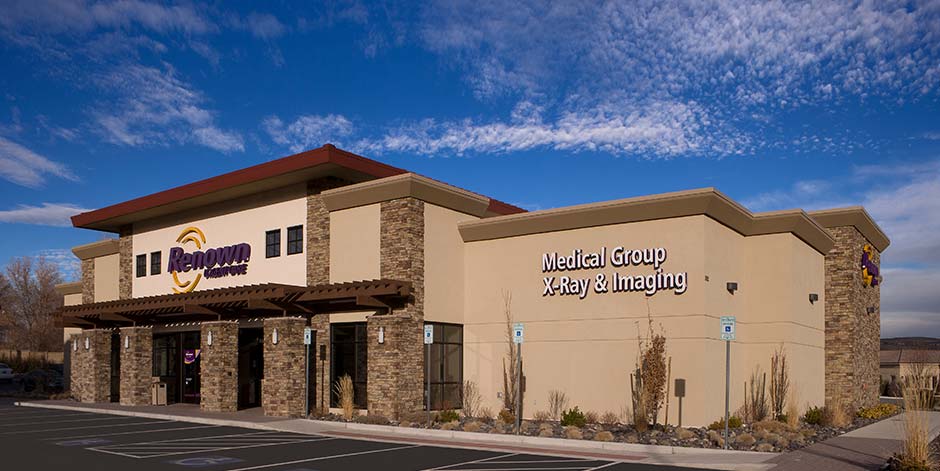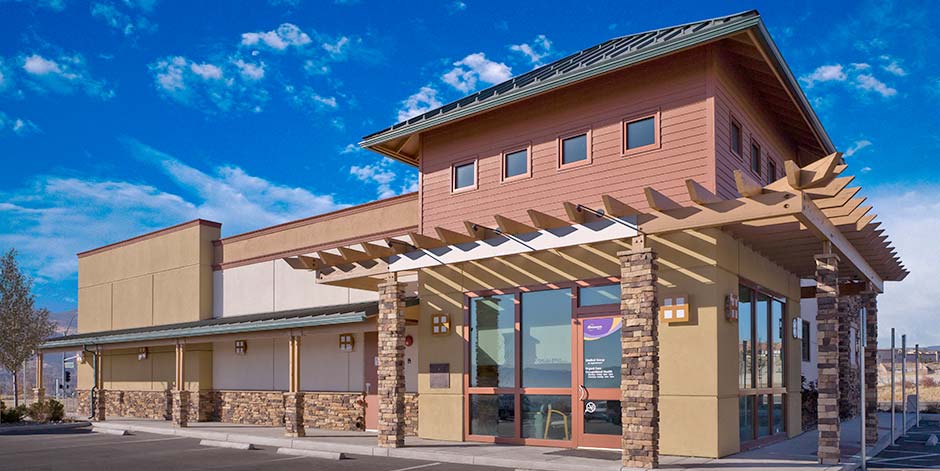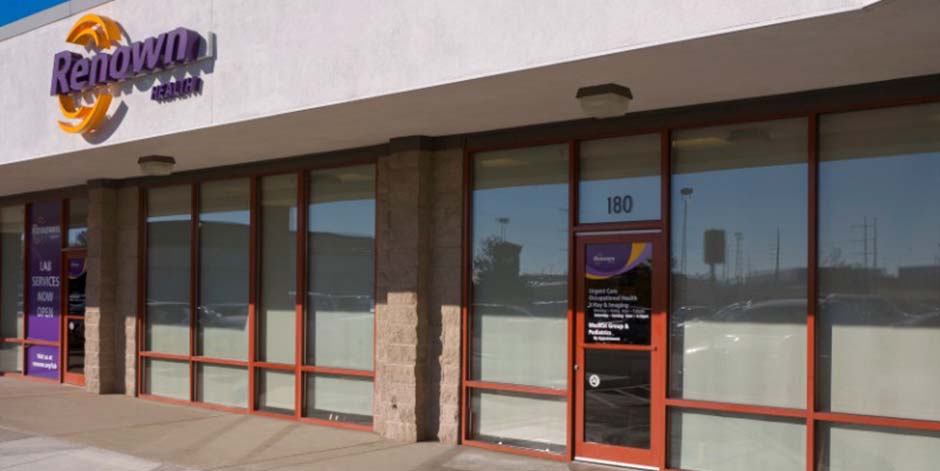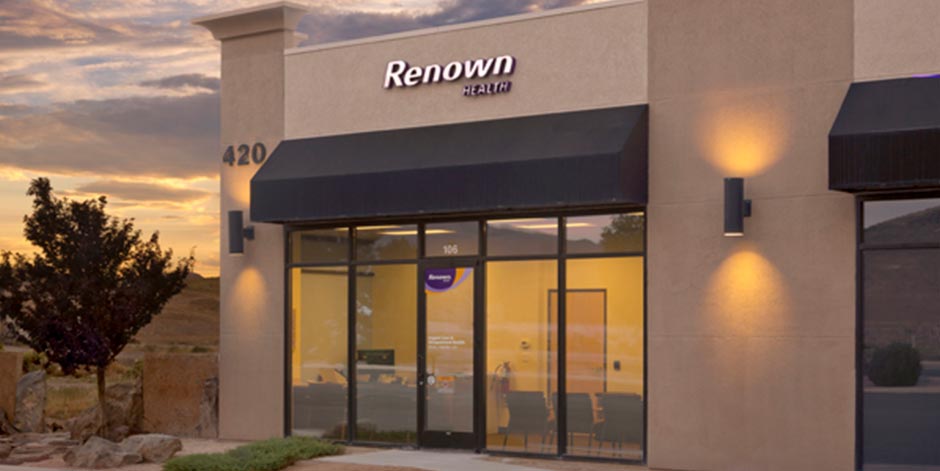Search
Results for 'medical records'
Clear-
Questions to Ask Your Neurologist at Your First Appointment
When it comes to your neurological health, seeking the expertise of a specialist is crucial. The Renown Institute for Neurosciences provides comprehensive care for complex diseases affecting brain, spinal cord and peripheral nerves. Let us help guide you through the appointment process to ensure a productive and informative first appointment. What to Expect at Your First Appointment at the Renown Institute for Neurosciences Duration and Purpose: Your first appointment will last approximately one hour. This time allows the doctor to ask specific questions, do a thorough neurological exam and discuss your concerns. Specialized Care: You will be matched with a provider who specializes in assessing and treating your specific ailment or condition. This tailored approach ensures that you receive care from an expert who has the specialized interest and expertise to address your needs effectively. Initial Assessment: During your visit, you will first see a medical assistant who reviews your medication history and standard screening questions provided by your doctor. Following this portion of your appointment, the neurologist will ask specific and detailed questions about your condition and conduct a non-invasive neurological examination to evaluate your brain and nervous system functioning. This exam involves painless tests assessing your cognitive function and nerve operation, including tests for sensation, strength and coordination. Treatment: After performing the neurological exam and addressing your questions, the neurologist will review the possible diagnosis and treatment plan, including any medication needs to help with your condition. Finally, your doctor may discuss the role of additional testing, including imaging studies (CT/MRIs), peripheral nerve testing (EMG) or brain wave testing (EEG), which will be scheduled for a later date. Making the Most of Your Visit To make your appointment as beneficial as possible, consider the following tips: Arrive Early: Plan to arrive at least 10 minutes early to fill out any necessary check-in items before your appointment's scheduled start time. This will ensure a smooth and timely visit. Bring Insurance Information: Have your insurance details readily available to facilitate the administrative process. This will help avoid any delays or confusion. Gather Medical Records: If you have received treatment or undergone tests with other healthcare providers relevant to your condition, bring along any medical records or test results. This information will assist your neurologist in gaining a comprehensive understanding of your medical history. Prepare Questions and Concerns: Consider noting the following, which can help you better answer questions the neurologist may ask during your appointment. The frequency, duration and severity of your symptoms. Share information about any medications or treatments you have tried for the condition and the outcomes. Prioritize questions to help the neurologist answer your most significant concerns during the initial visit. Your first appointment with a doctor at the Renown Institute for Neurosciences is an opportunity to receive expert care and gain insights into the best method of treatment for your condition. By understanding what to expect and following the tips provided, you can maximize your visit and be on your way to achieving overall health and wellness.
Read More About Questions to Ask Your Neurologist at Your First Appointment
-
Renown Neuro Diagnostic Laboratory Nationally Recognized
Earning its third five-year accreditation, Renown’s neuro-diagnostic lab remains Nevada’s only accredited ABRET facility. The Renown Institute for Neurosciences is pleased to announce that the neuro-diagnostic lab at Renown Regional Medical Center has been re-accredited by the American Board of Registration of Electroencephalographic and Evoked Potential Technologists (ABRET). ABRET’s lab accreditation process evaluates technical standards, the quality of a laboratory’s output, and lab management. “Renown Health is a leader and a destination for health in treating neurological disorders and advancing innovations in neurology. The specialists at the Renown Institute for Neurosciences provide comprehensive brain, nerve and surgical support along with a full range of diagnostic and additional procedures and a disease-specific, patient-focused approach to care,” says Tony Slonim, MD, DrPH, FACHE, President and CEO, Renown Health. “This prestigious honor from ABRET means Renown’s Electroencephalogram (EEG) Laboratory has met strict standards and is recognized as a place where patients and physicians can confidently receive quality diagnostics.” “In addition to re-accreditation from ABRET, the Institute for Neurosciences has earned a Gold Seal of Approval by the Joint Commission and offers advanced treatment options including t-PA (Tissue Plasminogen Activator) and biplane angiography. The Level III accredited Epilepsy laboratory implements some of the newest treatments available,” said Renown’s Chief Medical Officer, Paul Sierzenski, MD, MSHQS, CPE, FACEP. “Renown patients also have access to the most promising new therapies through national clinical trials, which have been shown to significantly improve patients’ health and well-being.” “I am proud to recognize our dedicated team of caregivers for their continued passion and excellence in maintaining the highest standards in patient care,” said Renown Institute for Neurosciences’ Division Chief, Dr. Rolando Ania. “It is all thanks to their tremendous efforts that we remain the only ABRET accredited laboratory, as well as the only nationally accredited epilepsy center (NAEC Level III), in the state of Nevada.” Using a collaborative approach, specialists at the Renown Institute for Neurosciences use leading-edge diagnostic tools to identify neurological conditions and treat patients with the most effective techniques available. What is a Neuro-diagnostic Lab? A neuro-diagnostic lab allows care teams the technology to evaluate how a patient’s peripheral, autonomic, and central nervous systems function, and aid in diagnosing and treating conditions such as epilepsy, multiple sclerosis, Parkinson’s disease, stroke, and other diseases of the nervous system. What is an Electroencephalogram (EEG)? An Electroencephalogram (EEG) is a test that measures and records the electrical activity of the brain. During the test, special sensors called electrodes are attached to the patient’s head and hooked by wires to a computer. The computer then records the brain’s electrical activity on the screen. Using a collaborative approach, specialists at the Renown Institute for Neurosciences use leading-edge diagnostic tools to identify neurological conditions and treat patients with the most effective techniques available. Renown Health hospitals are ranked as Nevada’s top hospitals by U.S. News & World Report.
Read More About Renown Neuro Diagnostic Laboratory Nationally Recognized
-
Renown Health Nationally Recognized for Commitment to Providing High-Quality Stroke Care With Three American Heart Association Recognitions
The American Heart Association presents Get With The Guidelines®- Stroke Gold Plus awards for proven dedication to ensuring all stroke patients have access to best practices and life-saving care. Renown Health emergency, medical and surgical providers have received three American Heart Association’s Get With The Guidelines® awards. These awards demonstrate commitment to ensuring stroke patients receive the most appropriate treatments according to nationally recognized, research-based guidelines; reducing disabilities and increasing the number of lives saved. Every 40 seconds, someone in the U.S. has a stroke. Stroke is the 5th leading cause of death in the U.S. and the main cause of adult disability. Studies show patients recover better when providers consistently follow treatment guidelines. Get With The Guidelines puts the expertise of the American Heart Association and American Stroke Association to work for hospitals nationwide, helping ensure patient care is aligned with the latest research and evidence-based guidelines. “A stroke is an extremely serious condition that requires emergent medical treatment. The faster treatment is provided, the lower the risk of brain injury. We are proud of our thousands of physicians, nurses and clinicians who consistently practice exceptional patient care by adhering to the latest treatment guidelines,” said Brian Erling, MD, MBA, President and CEO, Renown Health. “Get With The Guidelines makes it easier for our teams to put proven knowledge and consistent protocols to work on a daily basis, which studies show can help people live longer and better lives.” “As a participant in Get With The Guidelines programs, Renown qualified for the awards by demonstrating that physicians and clinicians across our integrated health system are committed to improving quality care for stroke patients,” said Bill Plauth, MD, MMM, CPE, Chief Medical Officer for Renown Health and Associate Dean for Clinical Affairs at the University of Nevada, Reno School of Medicine. “If you or a loved one is experiencing a stroke, call 911, as you need skilled medical care immediately. Stroke care focuses on helping people recover as much function as possible and return to independent living. The Renown Neurovascular and Stroke Program and Renown Rehabilitation Hospital teams provide expert emergency stroke care and comprehensive neurovascular care and rehabilitation services.” “We are pleased to recognize Renown Health for its commitment to caring for those in their community who need cardiovascular care,” said John Warner, MD, FAHA, past president of the American Heart Association and CEO of The Ohio State University Wexner Medical Center. “Hospitals that follow the American Heart Association’s quality improvement protocols often see improved patient outcomes, fewer readmissions and lower mortality rates – a win for health care systems, families and communities.” “Renown Regional Medical Center is the only designated Comprehensive Stroke Center in northern Nevada,” says Benjamin Pence, DO, Director, Institute for Neurosciences at Renown. “This means that we have the highest level of certification to receive and treat the most complex stroke cases. Our Institute for Neurosciences team is led by the area's top neurologists, and we conduct research studies involving new ways of preventing, diagnosing, and managing neurological disorders. We care for patients suffering from nerve and brain disorders due to stroke, headache, epilepsy, and other acute causes. We also monitor and develop treatment options for patients with memory and movement disorders such as Alzheimer’s, Parkinson's Disease or Multiple Sclerosis.” Renown Health also received the American Heart Association’s Target: Stroke Honor Roll Elite award. To qualify for this recognition, hospitals must meet specific criteria that reduce the time between an eligible patient’s arrival at the hospital (within 60 minutes or less) and treatment for at least 85 percent of applicable patients. “It is an honor to be among the American Heart Association’s Stroke Honor Roll Elite award recipients,” said Bret Frey, MD, president of Northern Nevada Emergency Physicians Care teams at Renown Health. “We adhere to these rigorous guidelines daily and demonstrate our unwavering commitment to ensuring more people in northern Nevada receive leading emergency and trauma care and the gift of extended, healthier lives.” Renown Health also received the American Heart Association’s Target: Type 2 Diabetes Honor Roll - Stroke award. Target: Type 2 Diabetes aims to ensure patients with Type 2 diabetes, who might be at higher risk for complications, receive the most up-to-date, evidence-based care when hospitalized due to stroke. This award is given to hospitals that qualify for the silver level or higher achievement award within the Get With The Guidelines – Stroke program and achieve an overall Diabetes Cardiovascular Initiative Composite Score of more than 80 percent. About Renown Health Renown Health is Nevada’s largest, not-for-profit integrated healthcare network serving Nevada, Lake Tahoe, and northeast California. With a diverse workforce of more than 7,000 employees, Renown has fostered a longstanding culture of excellence, determination, and innovation. The organization comprises a trauma center, two acute care hospitals, a children’s hospital, a rehabilitation hospital, a medical group and urgent care network, and the locally owned not-for-profit insurance company, Hometown Health. To join the Renown team, visit renown.org/careers. About Get With The Guidelines Get With The Guidelines® is the American Heart Association/American Stroke Association’s hospital-based quality improvement program that provides hospitals with the latest research-based guidelines. Developed with the goal of saving lives and hastening recovery, Get With The Guidelines has touched the lives of more than 12 million patients since 2001. For more information, visit heart.org.
-
 Renown Urgent Care - Los AltosRenown Urgent Care - Los AltosHours
Renown Urgent Care - Los AltosRenown Urgent Care - Los AltosHours
Mon-Fri8 a.m. - 7 p.m.Sat-Sun9 a.m. - 5 p.m. -
 Renown Urgent Care - Summit RidgeRenown Urgent Care - Summit RidgeHours
Renown Urgent Care - Summit RidgeRenown Urgent Care - Summit RidgeHours
Mon-Fri8 a.m. - 7 p.m.Sat-Sun9 a.m. - 5 p.m. -
What to do if you Experience a Summer Burn
As families spend more time outdoors to enjoy the summer temperatures, it's important to be aware of potential hazards that can lead to burns – be it sunburns, burns sustained while grilling or navigating the hot surfaces often found around pool decks and parks. All these burn types are not only painful but can also cause severe damage to the skin and require immediate medical attention. Ross Albright, MD, an emergency care physician, explores effective preventive measures to avoid burns during the summer and discusses when it's essential to seek medical care. Stay Sun Safe While soaking up the sun is a favorite summer pastime for many, it's important to protect your skin from harmful ultraviolet (UV) rays. Sunburns not only damage the skin but also increase the risk of more severe burns. Follow these tips for staying safe in the sun: Apply broad-spectrum sunscreen with a minimum SPF of 30 before heading outdoors and reapply every two hours. Seek shade during peak hours of sun intensity, typically between 10 a.m. and 4 p.m. Wear protective clothing, such as wide-brimmed hats, sunglasses and lightweight, long-sleeved garments. Fire and Hot Object Safety Summer is full of fun outdoor activities like BBQs, campfires and fireworks, all of which can pose a fire hazard if not handled carefully. To prevent burns caused by fires: Maintain a safe distance from open flames and grills and always use oven mitts or potholders when handling hot objects. Keep a fire extinguisher and a first aid kit readily available. Keep children away from hot objects and fireworks and educate them about the dangers of touching or playing with them. Hot Surface Safety Asphalt, metal slides and surfaces around the pool retain heat and are likely to be significantly hotter than other materials such as a wooden picnic table to grassy pathway (these can still be hot too!). So, it's crucial to be cautious around these materials to prevent burns: Use caution when near hot surfaces surrounding water sources, such as pool decks or metal slides. Always wear shoes when walking on hot surfaces such as asphalt, concrete and even sand. Ensure that playground equipment such as slides and swings are cool to the touch before your kiddos start climbing around. Recognizing Severity of Burns and Seeking Care Despite our best efforts, burns can still occur. It's essential to know when a burn requires medical attention: First-degree burns, characterized by redness, pain and minor swelling, can typically be treated at home with cool water and over-the-counter pain relievers such as ibuprofen (Advil or Motrin) or acetaminophen (Tylenol). Second-degree burns, which may cause blistering and more intense pain, should be evaluated by a healthcare professional. Third-degree burns, indicated by charring or blackened skin, deep tissue damage or burns that cover a large area, require immediate emergency care. Preventing burns during the summer is paramount to enjoying a safe and enjoyable season. By following these tips, you can significantly reduce the risk of burns and ensure prompt medical attention when necessary. Stay informed, stay safe and have a burn-free summer! If you or someone you know experiences a burn, it's important to seek immediate medical care.
-
 Renown Urgent Care - North HillsRenown Urgent Care - North HillsHours
Renown Urgent Care - North HillsRenown Urgent Care - North HillsHours
Mon-Fri8 a.m. - 7 p.m.Sat-Sun9 a.m. - 5 p.m. -
 Renown Urgent Care - USA ParkwayRenown Urgent Care - USA ParkwayHours
Renown Urgent Care - USA ParkwayRenown Urgent Care - USA ParkwayHours
Mon-Fri8 a.m. - 5 p.m.Sat-SunClosed -
Stroke Program
Stroke is the 5th leading cause of death in the U.S. and the main cause of adult disability. If you or a loved one is experiencing a stroke, you need skilled medical care immediately. The Renown Neurovascular and Stroke Program provides expert emergency stroke care and comprehensive neurovascular care and rehabilitation services. If you suspect that you, or someone around you, is having a stroke, don't hesitate and call 911 immediately.
-
Spine, Sports and Pain Management
How We Can Help You may benefit from treatment for neuromuscular (nerve, muscle and bone) disorders – that cause pain and impair normal functions. But, first, consult your primary care physician for a referral to Renown Health's Spine, Sport & Pain Management. Dr. Keating, Medical Director and his colleagues, Dr. Su and Dr. Storm, will customize a treatment plan that best suits your needs and lifestyle while providing the most effective care possible. For more information: Call 775-982-3608 | Fax 775-982-8001
-
Are You at Risk for Stroke?
Did you know an estimated 1.9 million neurons and 14 billion synapses are lost per minute during a stroke? That’s why every second counts. Anyone can have a stroke, but your chances increase if you have certain risk factors. That’s why the best way to protect yourself or your loved ones from a stroke is to know the risks and how to manage them. You can make changes to your lifestyle to lower your risk of stroke by asking yourself the following questions: 1. Is my blood pressure normal? High blood pressure is the leading cause of stroke and the most important controllable risk factor. If you’ve had a stroke, lowering your blood pressure can help prevent future strokes. 2. Can I quit smoking? Smoking damages blood vessels, clogs arteries and raises blood pressure — doubling your risk of stroke. If you want to reduce your risk of stroke and heart attack, quitting smoking is the first step — and Renown can help you with this. Learn more: Renown Health Quit Tobacco Program. 3. Do I make time to exercise 30 minutes a day? Many studies link consistent exercise habits with lower stroke risk. Also, being overweight contributes to high cholesterol, high blood pressure, heart disease and diabetes, all increasing your stroke risk. You don’t need to run a marathon — just commit to making time to move each day. 4. Do I regularly eat processed food and sugar? Eating less cholesterol and fat, especially saturated and trans fats, may reduce the fatty deposits (plaque) in your arteries. Also, eating five or more servings of fruits and vegetables per day may reduce your stroke risk. If you are diabetic, follow recommendations to get your diabetes under control.
-
Women and Stroke Surprising Signs to Know
Stroke is unfortunately common, with 1 in 5 American women experiencing it each year. When it comes to a stroke the phrase “time is brain” speaks to the urgency of getting rapid care. In fact, a woman may lose nearly 2 million neurons per minute of oxygen loss to the brain. The Renown Health Comprehensive Stroke Center experts share the importance of timely treatment and how stroke symptoms can differ in women. Women and Stroke – Surprising Symptoms Each year stroke affects more women than men. Even more concerning, women are less likely to recover from a stroke. The following non-traditional, less common, warning signs can be common in women: Hiccups with chest pain Sudden disorientation, drowsiness, confusion or a general altered mental status Nausea or vomiting A sudden headache that feels like the ‘worst headache of your life’ Unusual chest pain (especially with hiccups) Body numbness or weakness, such as an arm or leg suddenly ‘falling asleep’ Fainting or loss of consciousness Stroke Diagnosis The first step is neuroimaging by CT scan. This allows for rapid identification of any bleed, and also assists in determining candidacy for the early clot busting medication. MRI brain imaging is much higher resolution, and can better determine the core stroke size, assisting in prognosis and recovery. Since strokes have several different origins, an inpatient workup is essential to determine the underlying cause. Whether the stroke is secondary to plaque in the large vessels, clots being thrown in the setting of atrial fibrillation (an abnormal heart rhythm), or small vessel disease from years of uncontrolled vascular risk factors (high blood pressure, smoking, high cholesterol, diabetes), determining the cause is essential to implementing a management plan to reduce risk for further strokes. Quick Treatment for Stroke is Key Early recognition of stroke symptoms and seeking prompt attention is paramount. There are interventions that can be instituted to minimize the stroke and increase likelihood of recovery, but only if a patient presents to the hospital early. A clot busting medication, called tPA, can be given to patients with stroke if given within 4-5 hours from time of onset. Renown Regional Health Center is designated as a Comprehensive Stroke Center, the highest level of stroke certification available. To earn the designation of comprehensive stroke center, a hospital has to meet stringent requirements, including biannual on-site evaluations. This includes care for ischemic stroke patients (lack of blood flow), hemorrhagic stroke patients (bleeds), and determining the underlying cause to guide secondary stroke management prevention. Stroke Symptoms Remember “B.E.F.A.S.T.” to recognize the symptoms of a stroke below: B – Balance Being off balance or dizzy, is common. E – Eyes An eyesight change such as blurring or double vision may occur. F – Face droop One side of the face, or lip, droops A – Arm weakness Does one arm drift down? S – Speech Talking may slur or sound strange. T – Time Time to call 911. Call an ambulance immediately if you or anyone else, experiences any of these symptoms.


.jpg?rev=f89fdc95b1824f868e98988928b0a6bb)



